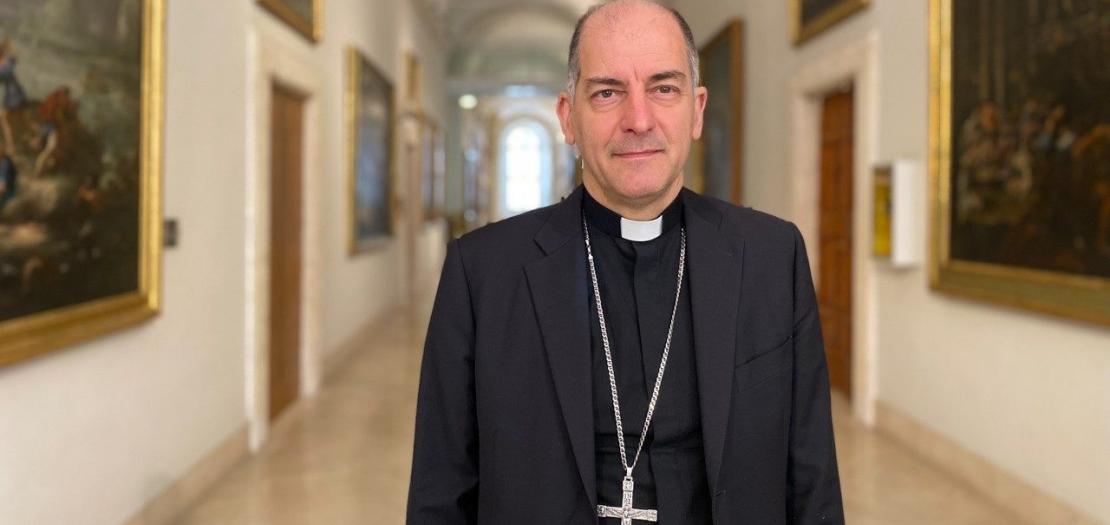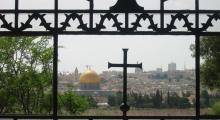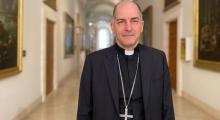Issued by the Catholic Center for Studies and Media - Jordan. Editor-in-chief Fr. Rif'at Bader - موقع أبونا abouna.org

His Majesty Abdullah II is paying in these days his first official visit to Pope Leo XIV. This visit confirms the relationship of mutual respect and collaboration between the Hashemite Kingdom of Jordan and the Holy See, which represents 1.3 billion Catholics and has diplomatic relations with 184 countries worldwide. The relationship with Jordan has deep roots. Saint Paul VI was the first Pope to board a plane: his first flight took him in January 1964 from Rome to Amman, where he began his pilgrimage to the Holy Land. After him, Saint John Paul II, Benedict XVI, and Pope Francis began their visits to the Holy Land from Jordan. The Kings of Jordan, from His Majesty King Hussein to King Abdullah II, have also met with the Popes in Rome. Beyond these high-level relations, diplomatic and cultural collaboration continues. I would at least like to mention the exhibition: Jordan, the Dawn of Christianity, which took place at the Vatican in February of this year. It was the first exhibition by an Arab country in the Vatican. Why this close collaboration, given that the Holy See does not have an economic or military power like other members of the international community?
A first reason is the Holy See's commitment to seeking and promoting peace. Here, collaboration with Jordan is crucial, because the Kingdom is a factor of stability for the entire Middle East. The Kingdom of Jordan's efforts to promote harmony not only within its borders but throughout the region are well known. This country's stability has repercussions on the Levant, for a shared path toward peace and stability. This is clearly demonstrated by the events of the last two years of war in Gaza. The Holy See and Jordan have found themselves aligned in calling, along with the release of hostages and prisoners, for an end to the war and for a global commitment to implementing the United Nations resolution calling for the creation of two states, and therefore also a Palestinian state. Furthermore, Jordan has been at the forefront in providing humanitarian assistance to the people of Gaza, assistance that the Holy See has forcefully requested to alleviate the suffering of so many. In this context, I cannot forget the commitment of the Latin Patriarch of Jerusalem, Cardinal Pizzaballa, who has visited Gaza on several occasions, including with the Greek-Orthodox Patriarch of Jerusalem, Theophilos III, providing aid to the population, and reminding everyone over the past two years that so much pain must end. The Catholic Church always works to safeguard the human dignity of every person, regardless of ethnic group or religion. We must all learn to look at the suffering of others with human eyes, that is, with the awareness that the other is a human being like me. It may be helpful for everyone to remember a maxim from the Gospel with which we can all identify: "Whatever you wish that men would do to you, do so to them." If we observed this maxim, we would be spared much suffering.
A second reason for the profound relationship between the Holy See and the Kingdom of Jordan is the shared interest in defending, preserving, and promoting Christian communities in the Kingdom and the Middle East in general. Jordan is an exemplary country in this regard, because it respects freedom of worship and freedom of conscience, and thus Christian communities can live their faith, and indeed are appreciated for their contribution. The Catholic Church, in its various rites and institutions, demands to continue exercising its mission with full autonomy, precisely to continue offering its services to Jordanian society as a whole. I am thinking for example in this regard of the considerable number of Catholic schools in the country, schools whose level of education is appreciated, schools that serve Jordanians, regardless of their cultural or religious affiliation. Schools, in particular, are a particularly important area, because they shape the future of this country. The Catholic Church is interested in fostering a positive future for the Kingdom of Jordan. During my stay in this country, I was deeply struck by the fact that many prominent figures studied in a Catholic school. These personalities are a concrete example that the Church does not work for itself, but for the good of the societies in which it exists.
I would like to mention another positive aspect in this regard. Jordan is fortunate to have Christian personalities in the political sphere, representing our community in the government, parliament, and institutions. This too is a concrete factor demonstrating that Christians are not only not alien to the society in which they live, but rather help it and contribute to its well-being as citizens first and foremost. I would therefore like to touch on a concept dear to the social doctrine of the Church: the common good. In our way of conceiving society and its relationships, one of the principles that must govern living together is the pursuit of the good, where the pursuit of the good of the individual must be in harmony with the good of society as a whole. That is, all are called, in seeking their own good, to also seek the good of all. This pursuit of good, at the individual level but also at the community level, is what can help a society live in peace and harmony, avoiding tensions that are often simply the expression of one side's interests. History proves that Christians' contribution to the life of the Kingdom of Jordan has been made for the common good. I believe this is a principle that must accompany us into the future.
Finally, interreligious dialogue. The Holy See knows very well that, unfortunately, religion can be used not for good, but for evil. When religion is used to turn it into an ideology, when human dignity is obscured in the name of religion, when religion is radicalized to see others not as brothers but as enemies, this so-called religion does not serve humanity well. Instead, religion, by its very nature, seeks to open the way to God, a God we believe to be good and to desire the good of humanity. Religion seeks to help us live together, not to hate one another. I have many examples here in Jordan where religion has not been an obstacle, but has fostered relationships within society. A society that, while not uniform, is able to reconcile differences is a strong society. Jordan's is a society with many ethnic and religious components, yet fundamentally united. The Holy See, together with all the expressions of the Catholic Church, wishes to support respectful and collaborative relationships between different religions.
In his speech to the Strasbourg Parliament a few months ago, His Majesty King Abdullah II said that Jordan is proud to have the site of Jesus' Baptism on its soil. Therefore, I am convinced that His Majesty's visit to Pope Leo is not merely an official visit. It is a visit that seals collaboration and confirms the hope that, together, Jordan and the Holy See can pursue a future of peace, for Jordan and for the entire Middle East.







